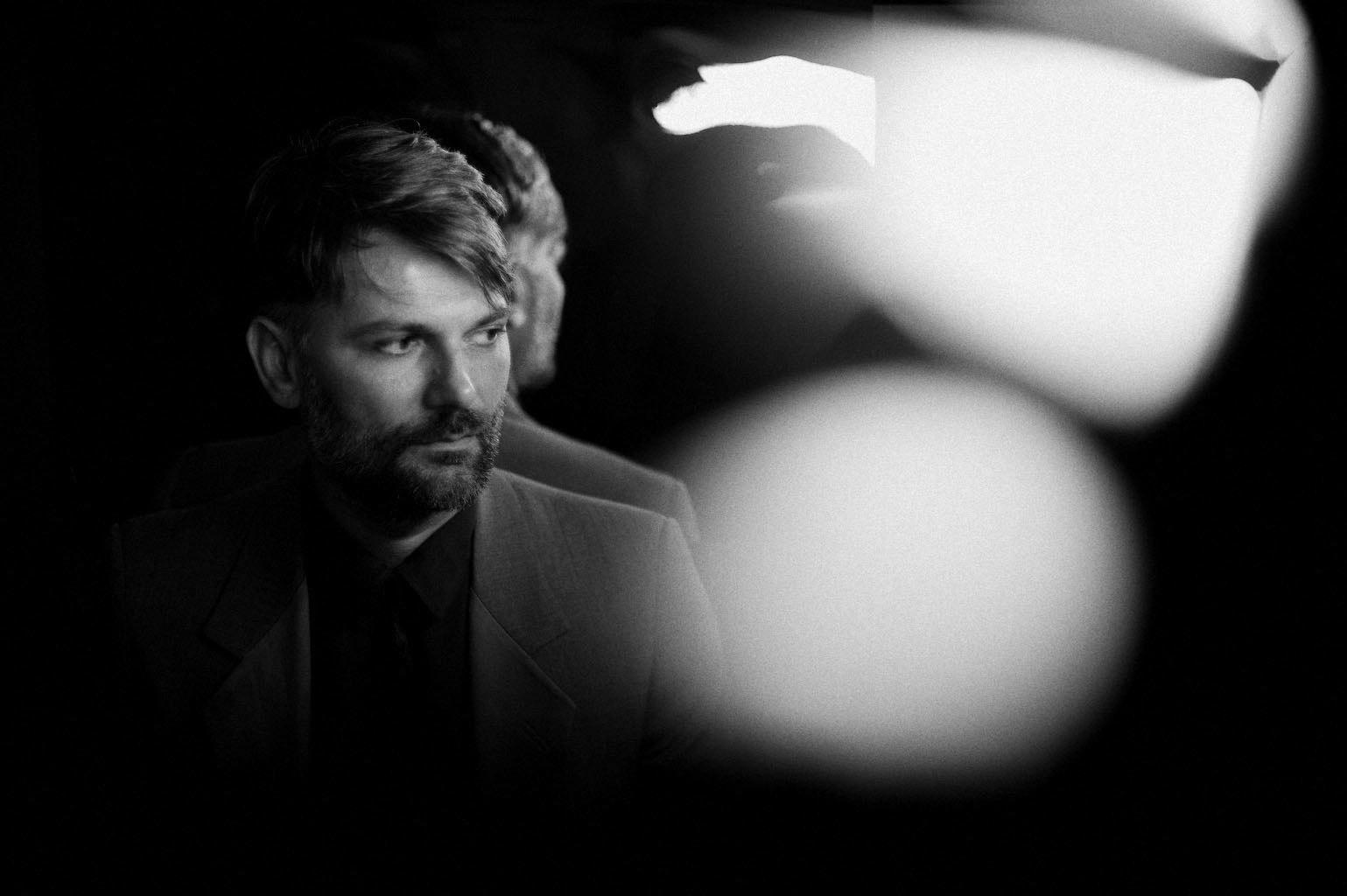Porcelain Raft, Without Fear

ABOVE: PORCELAIN RAFT’S MAURO REMIDDI. IMAGE COURTESY OF SHAWN BRACKBILL
At 40, Mauro Remiddi has lived a life that many novelists could only dream of: he’s assumed the part of Italian music ambassador to North Korea, undertaken restless vagabond touring throughout Europe with an accordion and a circus troupe for company, and, most recently, been an accomplished Londoner fronting a moderately successful indie-rock quintet. And as Porcelain Raft, his latest incarnation, Remiddi is only getting started.
In the two years since Remiddi spoke with Interview, he’s discovered marital bliss, a dedicated ZIP code in New York, and a blossoming solo career. Permanent Signal, out Tuesday (Secretly Canadian) appropriates upon the sryupy soundscapes of the Italian-born artist’s past work with high-resolution aplomb: songs rattle and hiss amid lush piano, Remiddi’s soaring tenor, and ever-swelling strings.
“The city feels like an echo chamber,” Remiddi says of his new home. “The sound reflects in a special way here. It feels very industrial. I don’t know if it’s electricity, but I feel like it’s something to do with reverberation here, which I really like.” Remiddi answered our phone call on an overcast Thursday afternoon in August, where he was on his way to a recital.
JOHN TAYLOR: What’s your earliest memory?
MAURO REMIDDI: I don’t want to sound creepy, but I remember when I couldn’t really talk. I was looking at the television and my mother just moved one of the curtains, so the sun started to hit the television, and I couldn’t see the television anymore. I started crying. I wasn’t able to find the words to say, “I can’t see this anymore, please do something about it.” I remember crying and not knowing exactly how to express myself; not because it was painful, or that I was too upset, but because there were no words. As human beings, sometimes we just cry when we don’t know how to say something. I just wanted to see the telly!
TAYLOR: As you’ve gotten older, do you find that certain memories stick with you? Or do they generally fade with time?
REMIDDI: I mean, at the very end, without memory we are nothing. The things you say; the way you feel; the way you act in certain situations… it’s because you have a memory of something. Imagine we are building the biggest, most solid room that we could ever have. And sometimes you need to work on it, because thoughts turn into memories. Sometimes they will start to create dreams and realities, and what actually happened changes inside yourself during the years. I think that’s how to preserve reality; we change it so it stays alive. The thoughts may change, but the feeling remains.
TAYLOR: How have those past experiences—and subsequent memories—shaped you? I recall reading that you visited North Korea in your 20s for a performance. Do you find parallels between shows in America and say, Pyongyang?
REMIDDI: Absolutely. With the trip in North Korea, I had so many amazing stories to tell, but to be honest, the thing that struck me the most were a couple of expressions that I saw.
TAYLOR: Expressions?
REMIDDI: I remember the translator. We had to do this photo shoot and hold a photo of Kim Jong-Il. I was like, “No way are we going to do this.” And, I remember the face of the translator; he never heard anyone say no in his entire life about something like that. His face was like a little kid that doesn’t understand the word “no.” There was something very cute and very childish about the whole thing, which I found funny because the situation was pretty dramatic. At the end, we had to do it. I still don’t know how we ended up there. It was just this guy, asking us to come and represent Italy in North Korea. I was probably 22, 23, and honestly pretty naïve.
TAYLOR: And your gig?
REMIDDI: That was propaganda. They were not real gigs. We were playing in the biggest theater that you have ever seen, and these people were all dressed the same. We would finish a song and [the audience] would start clapping after a few seconds, because it was on television, and people had to clap. And the food, it was like eating cardboard. We ate biscuits and cheese, it was so bad.
TAYLOR: [laughs]
REMIDDI: I was going insane. Two weeks without eating properly, with this sense of paranoia around, people following you.
TAYLOR: You must have come from a very supportive family, to have been able to pull a stunt like that at such a young age.
REMIDDI: I come from a very cool family. No one is an artist or anything, but they encouraged me so much when I was small. I grew up with people who said to me, “You can do anything.” So I didn’t have a strong base of how to survive in the sense of how to make a living, but it also makes you go very far.
TAYLOR: Far enough to join a traveling circus?
REMIDDI: When I was doing those things with the Berlin circus, playing the accordion, going to North Korea—I felt all those things were just me experimenting and letting myself go. Everything before seems like a constant searching. Now that I think about it, I feel so lucky that happened; that I didn’t find my voice straight away, that I didn’t find my passion straight away, that it took so long.
TAYLOR: And here you are.
REMIDDI: If I wanted to have one moment where the spotlight was on me, it would truly be this one, because I am 40 and I have something to say. It’s not like I’m talking randomly about me having sex for the first time, or all of this anger and this love that you feel. I’m not sure that I wanted to have the spotlight when I was so green, so young, and so silly about so many things. Getting old is the most the beautiful thing. I can’t wait until I’m 60, to be honest, reading the newspaper. I don’t know what I am going to do. I’ll probably keep on doing this and maybe some theater piece, some dance piece, some music for films. It’s exciting to grow. [pauses] I am talking too much.
TAYLOR: Not at all. [both laugh] Now, as someone who has spent a significant portion of his life traveling, do you feel as though you’ve found a home in New York?
REMIDDI: One of my lyrics says, “Places that feel like home, you look at them as if they are loose.” Home is not fixed—the feeling of home changes as you change. There are places that used to feel like home that don’t feel like home anymore. Like, I would go back to Rome to see my parents, and I would feel at home then. But if my parents were not in Rome, which is my city where I was born, I would not feel at home. It’s connected to people. It’s connected to a person I love.
TAYLOR: Your wife, Grace?
REMIDDI: Yeah. New York feels like home because of Grace.
TAYLOR: I understand the two of you met at CMJ.
REMIDDI: It was my first time in New York really playing. I met her, and we just started talking and never stopped. We are still talking from the first day we met. You know, when you engage so much with somebody it seems like the subjects never end. You can actually talk forever, and I felt like that with her. And at some point we shut up and got married.
TAYLOR: [laughs] Do you believe in love at first sight?
REMIDDI: I don’t think I’ve ever had that. I am somebody who starts to do something, and I keep on doing it without knowing if I like it or not. At some point I realize, “You know, I really like this,” and it could be music; it could be anything. I like to embrace life like that. I mean, I married [Grace] a few months after I saw her.
TAYLOR: And you knew.
REMIDDI: Sometimes I just trust certain intuitions on certain things. As we age, I start to follow it without being scared. So whatever it was—moving to New York, getting married with Grace—I always had that first impression about something. I’m not saying be superficial. I’m not about that. It’s more of a thing you have from the stomach. It’s a magnet, you are attracted to it. When I was younger, I would question it. I wouldn’t follow it. But as I get older, I am just going for it, without fear.
PERMANENT SIGNAL IS OUT AUGUST 20. PORCELAIN RAFT PLAYS SEPTEMBER 5 AT GLASSLANDS IN BROOKLYN. FOR MORE ON THE BAND, PLEASE VISIT ITS WEBSITE.






